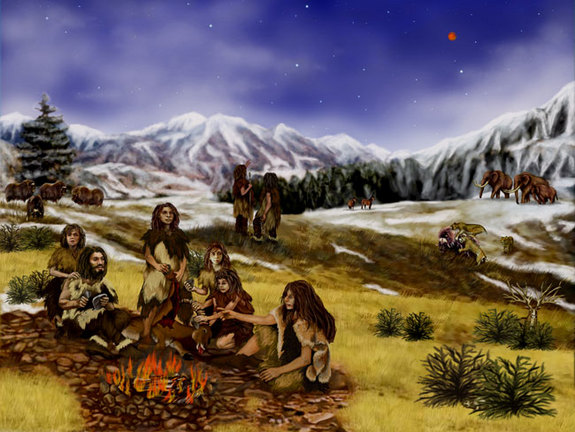(单词翻译:单击)
听力文本
This is Scientific American — 60-Second Science. I'm Christopher Intagliata.
Fifty thousand years ago, Homo sapiens weren't the only game in town. We were just one of several species of hominids roaming the Earth, like the Neandertals in Eurasia. And when our sapiens ancestors came in contact with them, they sometimes hooked up. Which means many people today of Eurasian descent still carry copies of Neandertal genes. But what do those genes do?
Researchers tried to answer that question by examining the modern human genome. And they found that, on average, Neandertal versions of genes are not active as much as their modern human counterparts in the brain—and the testicles. Meaning Neandertal variants have less influence there. Possibly, researchers say, because those tissues underwent significant changes since what became modern humans and Neandertals diverged 700,000 years ago.

"Really, our results show that Neandertal sequences that are present in modern humans aren't just silent remnants of hybridization that occurred 50,000 years ago, but they really have widespread measurable impacts on gene expression to this day." Rajiv McCoy, an evolutionary geneticist at the University of Washington. In other words, genes we got from Neandertals play roles in the activation of various other of our genes, leading to the production of different kinds of proteins.
The study is in the journal Cell.
It also turns out that, for one gene in particular, if you carry the Neandertal mutation, "you have slightly lower risk of schizophrenia. And you also have slightly increased height on average."
The Neandertals left their mark on lots of modern human traits, in addition to schizophrenia and height. But McCoy says, keep in mind: "These are complex traits. And they're controlled by thousands of different genes, and we're measuring statistically significant effects." Neandertals are long gone—but some of their genes live on.
Thanks for listening for Scientific American — 60-Second Science Science. I'm Christopher Intagliata.
参考译文
这里是科学美国人——60秒科学。我是克里斯托弗·因塔利亚塔。
五万年前,智人并不是唯一的种族。我们只是地球上多个原始人种之一,就像欧亚大陆上的尼安德特人。当我们的祖先同他们接触以后,他们有时会结合。这意味着现在许多欧亚大陆后裔依旧携带着尼安德特人的基因。那这些基因会产生什么影响呢?
研究人员试图通过研究现代人类的基因组来回答这个问题。他们发现,就大脑和睾丸的基因来说,平均而言,尼安德特人基因的活跃度低于现代人。这表明尼安德特人的基因变量对这两个器官的影响较小。研究人员表示,这可能是因为在大约70万年前,现代人类同尼安德特人分流以后,这些器官发生了重大变化。
“的确,我们的研究结果表明,作为5万年前杂交的残留物,现代人类体内的尼安德特人基因序列并没有默不作声,而是对现代的基因表现产生了广泛而重大的影响。”华盛顿大学的进化遗传学家拉吉夫·麦考伊说到。换句话说,尼安德特人的基因在激活我们身上各种其他基因方面发挥了作用,从而产生不同种类的蛋白质。
这项研究发表在《细胞》期刊上。
研究结果还表明,在一个特定的基因中,如果你携带尼安德特人变异体,“那你患精神分裂症的风险会降低。而且平均来说你的身高会更高。”
除精神分裂症和身高之外,尼安德特人对现代人的许多特性都产生了影响。但麦考伊说,要记住:“这些都是复杂的特征。它们由数千种基因控制,我们正在从统计方面测量其重要影响。”尼安德特人已经灭亡很长时间了,但是他们的一些基因仍然活着。
谢谢大家收听科学美国人——60秒科学。我是克里斯托弗·因塔利亚塔。
译文为可可英语翻译,未经授权请勿转载!
重点讲解
重点讲解:
1. on average 平均起来;基本上;
例句:his means that the registration process is often significantly simpler and faster, taking, on average, six months.
这意味着注册程序经常是十分简单和快速的,平均一般需要6个月。
2. in other words 换言之;换句话说;也就是说;
例句:In other words, whatever the prices, people will just have to buy them.
换句话说,无论价格如何变化,人们要买还得买。
3. in particular 尤其;特别;
例句:He loves science fiction in particular.
他特别喜爱科幻小说。
4. in addition to 另外;加之;除…之外;
例句:There are twelve registered letters to be sent in addition to this packet.
除了这个包裹外,还有12个挂号信也需投寄。


